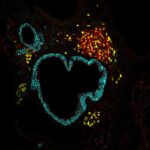
Publication: Mast Cells Are Not Essential for Pubertal Mammary Gland Branching.
Publié dans: Eur J Immunol 2025 Aug; 55(8): e70036
Auteurs: Kapoor S, Munz CM, Marsden J, Carvalho C, Tinsley H, Pinto MM, Malengier-Devlies B, Becker S, Seuzaret G, Patatsos K, Akyol R, Pederson AB, Wilson G, Dalod M, Gentek R
Résumé
Mast cells are long-lived, tissue-resident immune cells of the myeloid lineage with cardinal functions in allergy and atopic disease. They are now increasingly recognized also for protective roles, for example against infections and venoms. Other functions originally assigned to mast cells in development and physiology, however, have been refuted, and for yet others, the true contribution of mast cells remains uncertain. Mast cells have been implicated in promoting ductal branching in the pubertal mammary gland, the organ that produces and secretes milk in mammals, but these findings are based on mouse models that are not mast cell-specific. In this study, we therefore re-addressed the impact of mast cells on mammary gland branching using several complementary genetic models, including a newly generated transgenic mouse line (Ms4a2lsl-hDTR). We report that neither constitutive deficiency of mast cells, nor their conditional ablation induced at puberty affects mammary gland branching. Our results thus dispute that mast cells promote this process in mice, at least in a unique and non-redundant manner. This study adds to a growing body of work clarifying the biological roles of mast cells and further expands the toolbox available to the field of mast cell research.
Lien vers Pubmed [PMID] – 40820378
Lien vers le DOI – 10.1002/eji.70036

